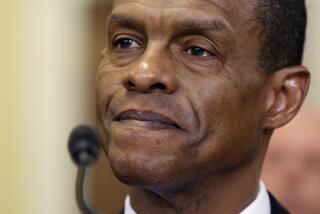Tribute to a War Hero
- Share via
Not too long ago many Americans believed marijuana was no more harmful than tobacco, and a presidential adviser described cocaine as “probably the most benign of illicit drugs currently in widespread use . . .” Back then, police officers fought a dangerous, lonely and unappreciated war against drugs. Los Angeles Police Officer Kelly Key was one of its troopers.
He was paralyzed nearly two decades ago by a bullet fired while he tried to serve a search warrant on a suspected cocaine dealer. Key died last week, having spent the rest of his life in a wheelchair from which he taught youngsters the dangers of drugs and other temptations of the streets.
A quadriplegic, he still volunteered three days a week at the Gwen Bolden Foundation, an after-school counseling program in a rough neighborhood south of downtown Los Angeles. Key was a tutor and a mentor, often for boys with no other man in their lives. He bought book-packs, shoes and treated youngsters to lunch, which was for many their first experience in a restaurant. He quietly did things to teach youngsters to feel good about themselves. There was no better role model in the war against drugs.
Drug use has exploded exponentially since a bullet cut short Key’s once-bright police career in 1970. Now it destroys lives, families and communities wholesale. As the terror of the nightmare grows, more officers like Key risk their lives. But, as law enforcement leaders are beginning to recognize, the war must be waged with equal fervor against the underlying social causes that make illicit drugs so alluring for so many. Prevention must be as important as enforcement.
Kelly Key, who turned 49 the day before he died, will be buried Tuesday with full Police Department honors. His tombstone should read: Pioneer and Hero in the War Against Drugs.
More to Read
Sign up for Essential California
The most important California stories and recommendations in your inbox every morning.
You may occasionally receive promotional content from the Los Angeles Times.













